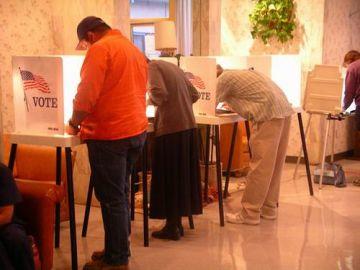
Section Branding
Header Content
Ballot Question Addresses Business Contracts
Primary Content

Supporters and opponents of little-known ballot questions are trying to get their voices heard as November nears.
Of this year's five ballot questions, the first would amend the state constitution to address non-compete contracts.
This could affect worker-employee relations in Georgia.
So-called "non-competes" are contracts that some employees have to sign as a condition of being hired.
They basically say that if a worker leaves his or her job, he or she cannot directly compete with his or her former employer.
Amendment One would strengthen such contracts.
Atlanta-based employment lawyer Cheryl Lagare opposes the amendment, whose ballot language states that it will make Georgia "more economically competitive."
In fact, Lagare says, the amendment would make Georgia less competitive to new businesses by restricting whom companies can hire and where employees can work.
"If you're the best at what you do, but you're subject to a non-compete with your employer, you won't be able to work for the new company nor will you be able to become an entrepreneur," Lagare says. "Current businesses in Georgia don't want competition."
Non-competes are a pain to some workers, including, it must be noted, to many in broadcast media, where the contracts are common.
(Many news anchors are prohibited from appearing on rival television stations for certain periods of time after they leave one station.)
But other industries employ them, as well, including those that rely on technical and sales expertise.
Cynthia Reichard of the Marietta-based fragrance company Arylessence says, she uses non-compete contracts to protect her investment.
"If I bring in an employee and then they move and they jump ship and go to another company, they take all of our contacts and all of our customers and potentially can take that business away from the company."
Reichard uses the example of a business owner who takes the risk of signing over his or her home to start a business, only to be undercut by a defecting employee.
Both sides say the other is overstating just how much the amendment would affect worker-employer relations.
That's because the amendment actually deals with the role of judges in non-compete litigation.
The amendment would give judges more of a say in deciding whether the terms of these agreements are fair.
Right now, if a judge deems a non-compete unfair, the judge must strike down the entire contract.
If the amendment passes, judges could strike down only the unfair portions of the contract, allowing the rest to stand.
That has the effect of strengthening the contracts.
But as to whom that benefits, again, there is disagreement.
"Employers would rather draft non-competes as broadly as possible and see what sticks in court," says Lagare, the employment lawyer. "It's going to be all judges that decide what these contracts mean."
"I think it benefits both," Reichard says. "Just as there are unscrupulous employees, there are unscrupulous employers."
Voters will settle the question in November.
Tags: election, amendment, elections, GPB News, constitutional amendment, non-compete contracts, employment law
Bottom Content

